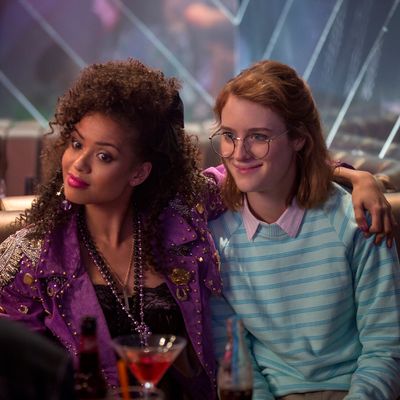
What is love worth? When we find such a rare and precious thing, what are we willing to sacrifice to keep it? Does giving yourself over to love require surrendering some small part of yourself? If that’s the case, is it really such a price to pay if the end result is eternal fulfillment? And, my god, is there any article of dated clothing that Mackenzie Davis can’t make work?
These are the weighty questions that Charlie Brooker and director Owen Harris consider in “San Junipero,” a tenderhearted and lavishly produced romance that provides a nice tonic after the soul-crushing bleakness of the first three episodes. This third season of Black Mirror, the longest yet at a whopping six episodes, has used its wiggle room to flit a little more freely between genres, touching on horror (“Playtest”), suspense (“Shut Up and Dance”), speculative fiction (“Nosedive”), police procedural (“Hated in the Nation”), and sci-fi-inflected war (“Men Against Fire”). “San Junipero” offers a softer, more sensitive alternative to the usual black-hearted subject matter, turning the usual fixation with technology toward a warm, humanistic end.
Harris flexes that Netflix-funded production budget from the opening shot, a flashy long-take reminiscent of Paul Thomas Anderson’s Boogie Nights opener that peered at ’70s-period accoutrement in the San Fernando Valley. But Harris has moved closer to the Cali shoreline and jumped ahead a decade: It’s 1987, and the beach town of San Junipero is a playground for telegenic young people eager to show off their most tubular fashions. Asymmetrical haircuts are the norm, no shade of neon is too bright, and synth pop rules the airwaves. (The era markers are almost leadenly obvious, but the episode’s most ingenious turn exposes that as a considered choice.) San Junipero seems to be all sun, surf, and sex, but because this is Black Mirror we’re talking about, of course there’s more going on than meets the eye.
For starters, there’s something off about Yorkie (Mackenzie Davis), and not just that she’s the single cutest nerd to have ever lived. The bespectacled new girl in town, she is timid and awkward around pretty much everyone and doesn’t really drink when she hits the clubs every weekend. In spite of herself, she befriends social butterfly Kelly (Gugu Mbatha-Raw, expectedly great), but appears nervous around her regardless. She mentions an engagement to a man we never see, without any explanation as to his conspicuous absence. She keeps checking the time, though it isn’t clear whether she’s waiting for something or dreading it.
Unaccountable weird tics and all, Kelly takes a shine to her and the two girls begin to bond, eventually adding romance to their friendship. Wrinkled bedsheets and hair-stroking pillow talk cannot last forever, though. An ambiguous force conspires to separate them, at first through what seems like time travel, but eventually is revealed to be something far more affecting.
Harris last took the Black Mirror director’s chair for the much-celebrated “Be Right Back,” or as the Friends writers would have titled it, “The One Where Domhnall Gleeson’s Twitter Gets Uploaded Into a Clone After He Dies and Fails at Loving His (Their?) Girlfriend.” Much like that standout episode, “San Junipero” takes a humanist approach toward an intriguing technological advance that alters primal emotional processes. Harris prefers stories about human behavior rather than technology for its own sake, and the uneasy point at which one begins to influence the other. Incidentally, the natural pairing for this episode is “Nosedive,” another glimpse at a handy invention that tampers both experience and personal identity.
Not much of this episode’s doozy of a premise can be safely discussed without tainting the elegantly deployed reveals, but it won’t do any harm to applaud Harris and Brooker’s final shot, a tricky gambit that concludes this arresting meditation on selflessness and commitment with a visual pun so elaborately set up and so goofy, you can’t help but love it. (You cannot possibly anticipate the new significance that Belinda Carlisle’s “Heaven Is a Place on Earth” takes on.) It might seem like a trivial note to stick on this elegantly woven story, but it does nothing to nullify the emotional power of everything that came before it. If anything, going out on a note of levity reminds the audience of the wide variety of life, itself a key theme in the episode. Everyone’s personal journey brings them through highs and lows, ecstasy and heartbreak, poignant fragility and fly-by-night hookups.
Beyond the considerations of love and eternity, there are more traditional marvels to appreciate as well: A study in opposites, Mbatha-Raw and Davis both turn in excellent performances that break through tentativeness to reach something uncommonly intimate, doubly uncommon on this of all shows. Place and time are of the utmost importance here, and Harris grounds his story in its era through nostalgia totems that tap into deep-seated memories. (Who doesn’t remember where they saw Scream for the first time?) And set-dressing aside, Harris operates his camera with care: A shot of the lovers having an amorous roll in the hay slowly pans away to focus on waves lapping on the shoreline, tacitly communicating the respect Harris has for this budding relationship while setting up another chuckle-worthy sight gag.
“San Junipero” is Black Mirror at its best: not only crafted to visual perfection and wholly original, but filled with keen insight about what makes humans tick in addition to what makes gadgets go. Conventional wisdom suggests that we only invent things to make our lives better, and this hour counters with the notion that accepting that betterness can prove even more challenging than creating it in the first place. Don’t be afraid, Harris and Brooker tell us. It’s only love.

